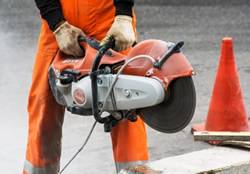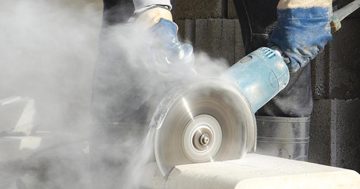 WorkSafe is monitoring how workplaces minimise the risk of employees contracting the deadly disease, silicosis.
WorkSafe is monitoring how workplaces minimise the risk of employees contracting the deadly disease, silicosis.
An inspection program began in July 2018, looking at stone benchtop fabricators where respirable crystalline silica (RCS) is generated during work activities.
Acting Director of WorkSafe, Eve Speyers said the program was widened in July 2019 to include other workplaces where RCS may be generated, such as during wall chasing and sample preparation in fire assay laboratories.
“The main aim of the program is to raise the standard of workplace safety and health in the industry by improving workplace control measures for managing worker exposure to RCS,” Ms Speyers said.
“It was initiated in response to serious concerns raised in Queensland about the high number of cases being diagnosed there. The number of cases identified in WA is considerably lower.”
She said however that inspectors had identified a need to continue and widen the proactive visits.
“Exposure to silica from cutting, grinding, sanding and polishing stone benchtops and other products containing silica may lead to silicosis, an irreversible lung disease that can cause permanent disability and lead to early death,” Ms Speyers said.
“Early inspections indicated a need to also look at other workplaces and activities that may involve products containing silica, including recommending measures such as on-tool extraction, improved ventilation systems, wet work methods and appropriate selection and correct use of respirators.”
She said that so far inspectors had visited 113 workplaces and issued 890 improvement notices and 12 prohibition notices, with information, guidance material and workplace checklists provided to all workplaces visited.
“While we found that many companies were using effective controls, many others fell short in areas such as a lack of health surveillance for all workers, respiratory protection, using uncontrolled dry cutting and waste water recovery systems,” Ms Speyers said.
“In addition to these issues, around one in five workplaces were found not to have provided employees with adequate information, training and safe work procedures around silica.”
She said WorkSafe’s current plan was to continue the inspection program until at least the end of the current financial year.










